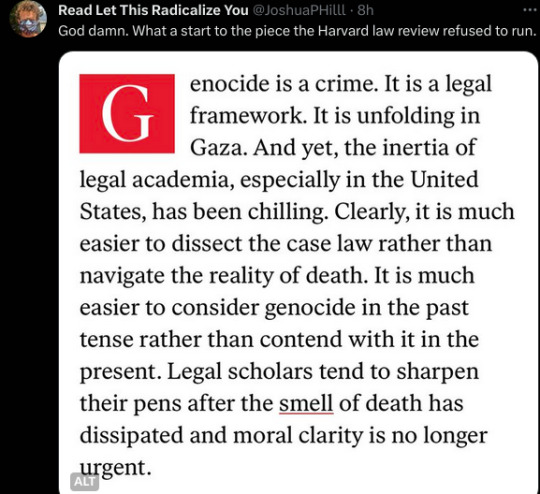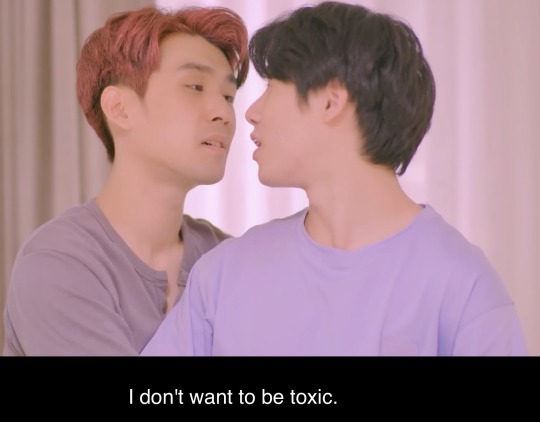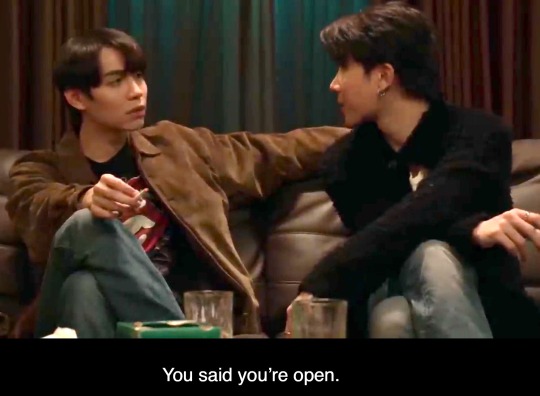#law reviews
Text

In a statement that was shared with The Nation, a group of 25 HLR editors expressed their concerns about the decision. “At a time when the Law Review was facing a public intimidation and harassment campaign, the journal’s leadership intervened to stop publication,” they wrote. “The body of editors—none of whom are Palestinian—voted to sustain that decision. We are unaware of any other solicited piece that has been revoked by the Law Review in this way. “
When asked for comment, the leadership of the Harvard Law Review referred The Nation to a message posted on the journal’s website. “Like every academic journal, the Harvard Law Review has rigorous editorial processes governing how it solicits, evaluates, and determines when and whether to publish a piece…” the note began. ”Last week, the full body met and deliberated over whether to publish a particular Blog piece that had been solicited by two editors. A substantial majority voted not to proceed with publication.”
Today, The Nation is sharing the piece that the Harvard Law Review refused to run.
Some may claim that the invocation of genocide, especially in Gaza, is fraught. But does one have to wait for a genocide to be successfully completed to name it? This logic contributes to the politics of denial. When it comes to Gaza, there is a sense of moral hypocrisy that undergirds Western epistemological approaches, one which mutes the ability to name the violence inflicted upon Palestinians. But naming injustice is crucial to claiming justice. If the international community takes its crimes seriously, then the discussion about the unfolding genocide in Gaza is not a matter of mere semantics.
The UN Genocide Convention defines the crime of genocide as certain acts “committed with the intent to destroy, in whole or in part, a national, ethnical, racial or religious group, as such.” These acts include “killing members of a protected group” or “causing serious bodily or mental harm” or “deliberately inflicting on the group conditions of life calculated to bring about its physical destruction in whole or in part.”
Numerous statements made by top Israeli politicians affirm their intentions. There is a forming consensus among leading scholars in the field of genocide studies that “these statements could easily be construed as indicating a genocidal intent,” as Omer Bartov, an authority in the field, writes. More importantly, genocide is the material reality of Palestinians in Gaza: an entrapped, displaced, starved, water-deprived population of 2.3 million facing massive bombardments and a carnage in one of the most densely populated areas in the world. Over 11,000 people have already been killed. That is one person out of every 200 people in Gaza. Tens of thousands are injured, and over 45% of homes in Gaza have been destroyed. The United Nations Secretary General said that Gaza is becoming a “graveyard for children,” but a cessation of the carnage—a ceasefire—remains elusive. Israel continues to blatantly violate international law: dropping white phosphorus from the sky, dispersing death in all directions, shedding blood, shelling neighborhoods, striking schools, hospitals, and universities, bombing churches and mosques, wiping out families, and ethnically cleansing an entire region in both callous and systemic manner. What do you call this?
The Center for Constitutional Rights issued a thorough, 44-page, factual and legal analysis, asserting that “there is a plausible and credible case that Israel is committing genocide against the Palestinian population in Gaza.” Raz Segal, a historian of the Holocaust and genocide studies, calls the situation in Gaza “a textbook case of Genocide unfolding in front of our eyes.”
#palestine#gaza#free palestine#end the the colonialism#end the occupation#harvard#harvard law review#genocide
7K notes
·
View notes
Text














i know July's not over yet (and shit can happen) but i'm going offline for a while
Edit: Barbie and Oppenheimer deserve their own Stefan recap that i'll do when i'm gonna be back home and watch it (so in August) lol
#twitter#threads#tree law#moon landing#sag aftra#ups#sag strike#jensen ackles#ao3#archive of our own#supernatural#keke palmer#quinton reviews#dashcon#greta thunberg#kaarija#käärijä#deadpool#tumblr news update
3K notes
·
View notes
Text
The long, bloody lineage of private equity's looting

Tomorrow (June 3) at 1:30PM, I’m in Edinburgh for the Cymera Festival on a panel with Nina Allen and Ian McDonald.
Monday (June 5) at 7:15PM, I’m in London at the British Library with my novel Red Team Blues, hosted by Baroness Martha Lane Fox.

Fans of the Sopranos will remember the “bust out” as a mob tactic in which a business is taken over, loaded up with debt, and driven into the ground, wrecking the lives of the business’s workers, customers and suppliers. When the mafia does this, we call it a bust out; when Wall Street does it, we call it “private equity.”
It used to be that we rarely heard about private equity, but then, as national chains and iconic companies started to vanish, this mysterious financial arrangement popped up with increasing frequency. When a finance bro’s presentation on why Olive Garden needed to be re-orged when viral, there was a lot off snickering about the decline of a tacky business whose value prop was unlimited carbs. But the bro was working for Starboard Value, a hedge fund that specialized in buhying out and killing off companies, pocketing billions while destroying profitable businesses.
https://www.salon.com/2014/09/17/the_real_olive_garden_scandal_why_greedy_hedge_funders_suddenly_care_so_much_about_breadsticks/
Starboard Value’s game was straightforward: buy a business, load it with debt, sell off its physical plant — the buildings it did business out of — pay itself, and then have the business lease back the buildings, bleeding out money until it collapsed. They pulled it with Red Lobster,and the point of the viral Olive Garden dis track was to soften up the company for its own bust out.
The bust out tactic wasn’t limited to mocking middlebrow family restaurants. For years, the crooks who ran these ops did a brisk trade in blaming the internet. Why did Sears tank? Everyone knows that the 19th century business was an antique, incapable of mounting a challenge in the age of e-commerce. That was a great smokescreen for an old-fashioned bust out that saw corporate looters make off with hundreds of millions, leaving behind empty storefronts and emptier pension accounts for the workers who built the wealth the looters stole:
https://prospect.org/economy/vulture-capitalism-killed-sears/
Same goes for Toys R Us: it wasn’t Amazon that killed the iconic toy retailer — it was the PE bosses who extracted $200m from the chain, then walked away, hands in pockets and whistling, while the businesses collapsed and the workers got zero severance:
https://www.washingtonpost.com/news/business/wp/2018/06/01/how-can-they-walk-away-with-millions-and-leave-workers-with-zero-toys-r-us-workers-say-they-deserve-severance/
It’s a good racket — for the racketeers. Private equity has grown from a finance sideshow to Wall Street’s apex predator, and it’s devouring the real economy through a string of audactious bust outs, each more consequential and depraved than the last.
As PE shows that it can turn profitable businesses gigantic windfalls, sticking the rest of us with the job of sorting out the smoking craters they leave behind, more and more investors are piling in. Today, the PE sector loves a rollup, which is when they buy several related businesses and merge them into one firm. The nominal business-case for a rollup is that the new, bigger firm is more “efficient.” In reality, a rollup’s strength is in eliminating competition. When all the pet groomers, or funeral homes, or urgent care clinics for ten miles share the same owner, they can raise prices, lower wages, and fuck over suppliers.
They can also borrow. A quirk of the credit markets is that a standalone small business is valued at about 3–5x its annual revenues. But if that business is part of a large firm, it is valued at 10–20x annual turnover. That means that when a private equity company rolls up a comedy club, ad agency or water bottler (all businesses presently experiencing PE rollup), with $1m in annual revenues, it shows up on the PE company’s balance sheet as an asset worth $10–20m. That’s $10–20m worth of collateral the PE fund can stake for loans that let it buy and roll up more small businesses.
2.9 million Boomer-owned businesses, employing 32m people, are expected to sell in the next couple years as their owners retire. Most of these businesses will sell to PE firms, who can afford to pay more for them as a prelude to a bust out than anyone intending to operate them as a productive business could ever pay:
https://pluralistic.net/2022/12/16/schumpeterian-terrorism/#deliberately-broken
PE’s most ghastly impact is felt in the health care sector. Whole towns’ worth of emergency rooms, family practices, labs and other health firms have been scooped up by PE, which has spent more than $1t since 2012 on health acquisitions:
https://pluralistic.net/2022/11/17/the-doctor-will-fleece-you-now/#pe-in-full-effect
Once a health care company is owned by PE, it is significantly more likely to commit medicare fraud. It also cuts wages and staffing for doctors and nurses. PE-owned facilities do more unnecessary and often dangerous procedures. Appointments get shorter. The companies get embroiled in kickback scandals. PE-backed dentists hack away at children’s mouths, filling them full of root-canals.
https://pluralistic.net/2022/11/17/the-doctor-will-fleece-you-now/#pe-in-full-effect
The Healthcare Private Equity Association boasts that its members are poised to spend more than $3t to create “the future of healthcare.”
https://hcpea.org/#!event-list
As bad as PE is for healthcare, it’s worse for long-term care. PE-owned nursing homes are charnel houses, and there’s a particularly nasty PE scam where elderly patients are tricked into signing up for palliative care, which is never delivered (and isn’t needed, because the patients aren’t dying!). These fake “hospices” get huge payouts from medicare — and the patient is made permanently ineligible for future medicare, because they are recorded being in their final decline:
https://pluralistic.net/2023/04/26/death-panels/#what-the-heck-is-going-on-with-CMS
Every part of the health care sector is being busted out by PE. Another ugly PE trick, the “club deal,” is devouring the medical supply business. Club deals were huge in the 2000s, destroying rent-controlled housing, energy companies, Mervyn’s department stores, Harrah’s, and Old Country Joe. Now it’s doing the same to medical supplies:
https://pluralistic.net/2021/05/14/billionaire-class-solidarity/#club-deals
Private equity is behind the mass rollup of single-family homes across America. Wall Street landlords are the worst landlords in America, who load up your rent with junk fees, leave your home in a state of dangerous disrepair, and evict you at the drop of a hat:
https://pluralistic.net/2021/08/16/die-miete-ist-zu-hoch/#assets-v-human-rights
As these houses decay through neglect, private equity makes a bundle from tenants and even more borrowing against the houses. In a few short years, much of America’s desperately undersupplied housing stock will be beyond repair. It’s a bust out.
You know all those exploding trains filled with dangerous chemicals that poison entire towns? Private equity bust outs:
https://pluralistic.net/2022/02/04/up-your-nose/#rail-barons
Where did PE come from? How can these people look themselves in the mirror? Why do we let them get away with it? How do we stop them?
Today in The American Prospect, Maureen Tkacik reviews two new books that try to answer all four of these questions, but really only manage to answer the first three:
https://prospect.org/culture/books/2023-06-02-days-of-plunder-morgenson-rosner-ballou-review/
The first of these books is These Are the Plunderers: How Private Equity Runs — and Wrecks — America by Gretchen Morgenson and Joshua Rosner:
https://www.simonandschuster.com/books/These-Are-the-Plunderers/Gretchen-Morgenson/9781982191283
The second is Plunder: Private Equity’s Plan to Pillage America, by Brendan Ballou:
https://www.hachettebookgroup.com/titles/brendan-ballou/plunder/9781541702103/
Both books describe the bust out from the inside. For example, PetSmart — looted for $30 billion by RaymondSvider and his PE fund BC Partners — is a slaughterhouse for animals. The company systematically neglects animals — failing to pay workers to come in and feed them, say, or refusing to provide backup power to run during power outages, letting animals freeze or roast to death. Though PetSmart has its own vet clinics, the company doesn’t want to pay its vets to nurse the animals it damages, so it denies them care. But the company is also too cheap to euthanize those animals, so it lets them starve to death. PetSmart is also too cheap to cremate the animals, so its traumatized staff are ordered to smuggle the dead, rotting animals into random dumpsters.
All this happened while PetSmart’s sales increased by 60%, matched by growth in the company’s gross margins. All that money went to the bust out.
https://www.forbes.com/sites/antoinegara/2021/09/27/the-30-billion-kitty-meet-the-investor-who-made-a-fortune-on-pet-food/
Tkacik says these books show that we’re finally getting wise to PE. Back in the Clinton years, the PE critique painted the perps as sharp operators who reduced quality and jacked up prices. Today, books like these paint these “investors” as the monsters they are — crooks whose bust ups are crimes, not clever finance hacks.
Take the Carlyle Group, which pioneered nursing home rollups. As Carlyle slashed wages, its workers suffered — but its elderly patients suffered more. Thousands of Carlyle “customers” died of “dehydration, gangrenous bedsores, and preventable falls” in the pre-covid years.
https://www.washingtonpost.com/business/economy/opioid-overdoses-bedsores-and-broken-bones-what-happened-when-a-private-equity-firm-sought-profits-in-caring-for-societys-most-vulnerable/2018/11/25/09089a4a-ed14-11e8-baac-2a674e91502b_story.html
KKR, another PE monster, bought a second-hand chain of homes for mentally disabled adults from another PE company, then squeezed it for the last drops of blood left in the corpse. KKR cut wages to $8/hour and increased shifts to 36 hours, then threatened to have workers who went home early arrested and charged with “patient abandonment.” Many of these homes were often left with no staff at all, with patients left to starve and stew in their own waste.
PE loves to pick on people who can’t fight back: kids, sick people, disabled people, old people. No surprise, then, that PE loves prisons — the ultimate captive audience. HIG Capital is a $55b fund that owns TKC Holdings, who got the contract to feed the prisoners at 400 institutions. They got the contract after the prisons fired Aramark, owned by PE giant Warburg Pincus, whose food was so inedible that it provoked riots. TKC got a million bucks extra to take over the food at Michigan’s Kinross Correctional Facility, then, incredibly, made the food worse. A chef who refused to serve 100 bags of rotten potatoes (“the most disgusting thing I’ve seen in my life”) was fired:
https://www.wzzm13.com/article/news/local/michigan/prison-food-worker-i-was-fired-for-refusing-to-serve-rotten-potatoes/69-467297770
TKC doesn’t just operate prison kitchens — it operates prison commissaries, where it gouges prisoners on junk food to replace the inedible slop it serves in the cafeteria. The prisoners buy this food with money they make working in the prison workshops, for $0.10–0.25/hour. Those workshops are also run by TKC.
Tkacic traces private equity back to the “corporate raiders” of the 1950s and 1960s, who “stealthily borrowed money to buy up enough shares in a small or midsized company to control its biggest bloc of votes, then force a stock swap and install himself as CEO.”
The most famous of these raiders was Eli Black, who took over United Fruit with this gambit — a company that had a long association with the CIA, who had obligingly toppled democratically elected governments and installed dictators friendly to United’s interests (this is where the term “banana republic” comes from).
Eli Black’s son is Leon Black, a notorious PE predator. Leon Black got his start working for the junk-bonds kingpin Michael Milken, optimizing Milken’s operation, which was the most terrifying bust out machine of its day, buying, debt-loading and wrecking a string of beloved American businesses. Milken bought 2,000 companies and put 200 of them through bankruptcy, leaving the survivors in a brittle, weakened state.
It got so bad that the Business Roundtable complained about the practice to Congress, calling Milken, Black, et al, “a small group is systematically extracting the equity from corporations and replacing it with debt, and incidentally accumulating major wealth.”
Black stabbed Milken in the back and tanked his business, then set out on his own. Among the businesses he destroyed was Samsonite, “a bankrupt-but-healthy company he subjected to 12 humiliating years of repeated fee extractions, debt-funded dividend payments, brutal plant closings, and hideous schemes to induce employees to buy its worthless stock.”
The money to buy Samsonite — and many other businesses — came through a shadowy deal between Black and John Garamendi, then a California insurance commissioner, now a California congressman. Garamendi helped Black buy a $6b portfolio of junk bonds from an insurance company in a wildly shady deal. Garamendi wrote down the bonds by $3.9b, stealing money “from innocent people who needed the money to pay for loved ones’ funerals, irreparable injuries, etc.”
Black ended up getting all kinds of favors from powerful politicians — including former Connecticut governor John Rowland and Donald Trump. He also wired $188m to Jeffrey Epstein for reasons that remain opaque.
Black’s shady deals are a marked contrast with the exalted political circles he travels in. Despite private equity’s obviously shady conduct, it is the preferred partner for cities and states, who buy everything from ambulance services to infrastructure from PE-owned companies, with disastrous results. Federal agencies turn a blind eye to their ripoffs, or even abet them. 38 state houses passed legislation immunizing nursing homes from liability during the start of the covid crisis.
PE barons are shameless about presenting themselves as upstanding cits, unfairly maligned. When Obama made an empty promise to tax billionaires in 2010, Blackstone founder SteveS chwarzman declared, “It’s a war. It’s like when Hitler invaded Poland in 1939.”
Since we’re on the subject of Hitler, this is a good spot to bring up Monowitz, a private-sector satellite of Auschwitz operated by IG Farben as a slave labor camp to make rubber and other materiel it supplied at a substantial markup to the wermacht. I’d never heard of Monowitz, but Tkacik’s description of the camp is chilling, even in comparison to Auschwitz itself.
Farben used slave laborers from Auschwitz to work at its rubber plant, but was frustrated by the logistics of moving those slaves down the 4.5m stretch of road to the facility. So the company bought 25,000 slaves — preferring children, who were cheaper — and installed them in a co-located death-camp called Monowitz:
https://www.commentary.org/articles/r-tannenbaum/the-devils-chemists-by-josiah-e-dubois-jr/
Monowitz was — incredibly — worse than Auschwitz. It was so bad, the SS guards who worked at it complained to Berlin about the conditions. The SS demanded more hospitals for the workers who dropped from beatings and overwork — Farben refused, citing the cost. The factory never produced a steady supply of rubber, but thanks to its gouging and the brutal treatment of its slaves, the camp was still profitable and returned large dividends to Farben’s investors.
Apologists for slavery sometimes claim that slavers are at least incentivized to maintain the health of their captive workforce. This was definitely not true of Farben. Monowitz slaves died on average after three months in the camp. And Farben’s subsidiary, Degesch, made the special Zyklon B formulation used in Auschwitz’s gas chambers.
Tkacik’s point is that the Nazis killed for ideology and were unimaginably cruel. Farben killed for money — and they were even worse. The banality of evil gets even more banal when it’s done in service to maximizing shareholder value.
As Farben historian Joseph Borkin wrote, the company “reduced slave labor to a consumable raw material, a human ore from which the mineral of life was systematically extracted”:
https://www.scribd.com/document/517797736/The-Crime-and-Punishment-of-I-G-Farben
Farben’s connection to the Nazis was a the subject of Germany’s Master Plan: The Story of Industrial Offensive, a 1943 bestseller by Borkin, who was also an antitrust lawyer. It described how Farben had manipulated global commodities markets in order to create shortages that “guaranteed Hitler’s early victories.”
Master Plan became a rallying point in the movement to shatter corporate power. But large US firms like Dow Chemical and Standard Oil waged war on the book, demanding that it be retracted. Borkin was forced into resignation and obscurity in 1945.
Meanwhile, in Nuremberg, 24 Farben executives were tried for their war crimes, and they cited their obligations to their shareholders in their defense. All but five were acquitted on this basis.
Seen in that light, the plunderers of today’s PE firms are part of a long and dishonorable tradition, one that puts profit ahead of every other priority or consideration. It’s a defense that wowed the judges at Nuremberg, so should we be surprised that it still plays in 2023?
Tkacik is frustrated that neither of these books have much to offer by way of solutions, but she understands why that would be. After all, if we can’t even close the carried interest tax loophole, how can we hope to do anything meaningful?
“Carried interest” comes up in every election cycle. Most of us assume it has something to do with “interest payments,” but that’s not true. The carried interest loophole relates to the “interest” that 16th-century sea captains had in their cargo. It’s a 600-year-old tax loophole that private equity bosses use to pay little or no tax on their billions. The fact that it’s still on the books tells you everything you need to know about whether our political class wants to do anything about PE’s plundering.
Notwithstanding Tkacik’s (entirely justified) skepticism of the weaksauce remedies proposed in these books, there is some hope of meaningful action. Private equity’s rollups are only possible because they skate under the $101m threshold for merger scrutiny. However, there is good — but unenforced — law that allows antitrust enforcers to block these mergers. This is the “incipiency standard” — Sec 7 of the Clayton Act — the idea that a relatively small merger might not be big enough to trigger enforcement action on its own, but regulators can still act to block it if it creates an incipient monopoly.
https://pluralistic.net/2022/12/16/schumpeterian-terrorism/#deliberately-broken
The US has a new crop of aggressive — fearless — top antitrust enforcers and they’ve been systematically reviving these old laws to go after monopolies.
That’s long overdue. Markets are machines for eroding our moral values: “In comparison to non-market decisions, moral standards are significantly lower if people participate in markets.”
https://web.archive.org/web/20130607154129/https://www.uni-bonn.de/Press-releases/markets-erode-moral-values
The crimes that monsters commit in the name of ideology pale in comparison to the crimes the wealthy commit for money.

Catch me on tour with Red Team Blues in Edinburgh, London, and Berlin!
If you’d like an essay-formatted version of this post to read or share, here’s a link to it on pluralistic.net, my surveillance-free, ad-free, tracker-free blog:
https://pluralistic.net/2023/06/02/plunderers/#farbenizers

[Image ID: An overgrown graveyard, rendered in silver nitrate monochrome. A green-tinted businessman with a moneybag in place of a head looms up from behind a gravestone. The right side of the image is spattered in blood.]
#pluralistic#kkr#lootersprivate equity#plunderers#books#reviews#monsters#nazis#godwin's law#godwins law#auschwitz#ig farben#pe#business#barbarians#united fruit#carried interest#corporate raiders#junk bonds#michael milliken#ensemble cast#carlyle group#monowitz#leon black
1K notes
·
View notes
Text
Genocide is a crime. It is a legal framework. It is unfolding in Gaza. And yet, the inertia of legal academia, especially in the United States, has been chilling. Clearly, it is much easier to dissect the case law rather than navigate the reality of death. It is much easier to consider genocide in the past tense rather than contend with it in the present. Legal scholars tend to sharpen their pens after the smell of death has dissipated and moral clarity is no longer urgent.
Some may claim that the invocation of genocide, especially in Gaza, is fraught. But does one have to wait for a genocide to be successfully completed to name it? This logic contributes to the politics of denial. When it comes to Gaza, there is a sense of moral hypocrisy that undergirds Western epistemological approaches, one which mutes the ability to name the violence inflicted upon Palestinians. But naming injustice is crucial to claiming justice. If the international community takes its crimes seriously, then the discussion about the unfolding genocide in Gaza is not a matter of mere semantics.
The UN Genocide Convention defines the crime of genocide as certain acts “committed with the intent to destroy, in whole or in part, a national, ethnical, racial or religious group, as such.” These acts include “killing members of a protected group” or “causing serious bodily or mental harm” or “deliberately inflicting on the group conditions of life calculated to bring about its physical destruction in whole or in part.”
Numerous statements made by top Israeli politicians affirm their intentions. There is a forming consensus among leading scholars in the field of genocide studies that “these statements could easily be construed as indicating a genocidal intent,” as Omer Bartov, an authority in the field, writes. More importantly, genocide is the material reality of Palestinians in Gaza: an entrapped, displaced, starved, water-deprived population of 2.3 million facing massive bombardments and a carnage in one of the most densely populated areas in the world. Over 11,000 people have already been killed. That is one person out of every 200 people in Gaza. Tens of thousands are injured, and over 45% of homes in Gaza have been destroyed. The United Nations Secretary General said that Gaza is becoming a “graveyard for children,” but a cessation of the carnage—a ceasefire—remains elusive. Israel continues to blatantly violate international law: dropping white phosphorus from the sky, dispersing death in all directions, shedding blood, shelling neighborhoods, striking schools, hospitals, and universities, bombing churches and mosques, wiping out families, and ethnically cleansing an entire region in both callous and systemic manner. What do you call this?
175 notes
·
View notes
Text




Bar Review Day 9. 90 days to the bar.
Went on a short road trip just to eat good food. Extended another day studying Poli out of necessity. My brother made me a Nespresso.
Watched a bit of the Men's French Open Finals. Got big plans for tomorrow. Hoping to conclude the "first" reading of Poli by tomorrow.
66 notes
·
View notes
Text

An exotic dancer proves her underwear is too large to have exposed herself after Florida arrest, 1983. She gave a convincing performance to the judge, and was acquitted
source
#american justice#law & order#Jury asking for more time to review evidence#funny pics#We need to review the briefs again your honour#funny
72 notes
·
View notes
Text
by Jessica Costescu
A Harvard University law student who was charged with two misdemeanors after accosting an Israeli classmate last October has now landed a job in Washington, D.C.'s public defender's office.
The student, identified in a Washington Free Beacon report as Harvard Law Review editor Ibrahim Bharmal, has landed an immigration law clerkship with the Public Defender Service for the District of Columbia, according to a LinkedIn post. Bharmal and divinity school graduate student Elom Tettey-Tamaklo were each charged with two misdemeanors on May 19 stemming from their conduct at an Oct. 18 "die-in" protest held outside Harvard Business School. Bharmal and Tettey-Tamaklo were captured on camera accosting a first-year Israeli business school student, surrounding the student and making it difficult for him to walk freely, as keffiyeh-clad onlookers shouted, "SHAME!"
Bharmal was charged with misdemeanor assault and battery and with violations of the Massachusetts Civil Rights Act, which prohibits attempts to "intimidate or interfere with … any other person in the free exercise or enjoyment of any right or privilege secured to him [or her] by the constitution." Bharmal is expected back in court in September for his arraignment and faces up to 100 days in jail for each count, court filings reviewed by the Free Beacon show.
There is no indication that Harvard has taken any disciplinary action against Bharmal. When asked if his pending charges and a possible conviction would impact his graduation—scheduled for next year—Harvard told the Free Beacon that it does "not comment on individual considerations related to discipline or student status."
Since the incident, Bharmal has remained in good standing with the school. In fact, Bharmal avoided discipline altogether, according to a January legal complaint. He is pursuing a joint degree program at the Ivy League university, namely a law degree and a master's in public policy, and still lists being an editor for the Harvard Law Review on his LinkedIn. Tettey-Tamaklo—the other student involved—was removed from his role as a freshman proctor in November, but otherwise, the school did "nothing to sanction" him, the complaint said.
Bharmal did not respond to a request for comment.
Meanwhile, on Tuesday, the D.C. public defender's office shared a post about Bharmal on LinkedIn, detailing his experience as a law clerk and thanking him for his "commitment to our clients." Bharmal says in the post that, after graduating Harvard, he would like to support "immigrants, asylum-seekers, and other newly arriving neighbors." The post also revealed a "fun fact" about Bharmal: "He is currently training to be a bollywood spin instructor...class sign-ups incoming."
The office did not respond to a request for comment on whether it was aware of Bharmal's ongoing legal proceedings.
49 notes
·
View notes
Text
This Week in BL - There's so much airing even I'm struggling to keep up
That's why I'm late.
Aug 2023 Wk 3

Ongoing Series - Thai
Laws of Attraction (Sat iQIYI) 6 of 8 - Oh no. I am totally in love with the escaped young master & his smitten bodyguard. How did that happen? (Be careful P’Thee the broken ones are the most tempting. Tin understands.) NO SINGING! Trust Thai BL to destroy any moment of sentiment I might have by picking up a damn guitar. And we finally get Charn’s Batman villain origin story. Good use of back hug! This is a GREAT show. Melodramatic as fuck, but GREAT. Gotta say this pair in NOT Thailand’s best kissers but not everyone can be Zee++. Still I think that + singing + a touch of overacting is likely to keep this out of the 10/10 club.
Dangerous Romance (Fri YT) ep 1 of 12 - Rich /poor dynamic with characters & set up exactly as expected. Chimon is great. Perth is good too. A real rich-kid bully, Heirs level or Japanese F4 evil. All the teachers are also corrupt (that’s kinda a Thai thing, I think because they can't call out the government). I gotta say, Marc is doing a bang-up job as the jock friend, too. And the kiss twist was fun. All in all, this is good. And you know me, I love a high school BL.
I Feel You Linger in the Air (Sat YT) ep 1 of 12 - The time travel historical romance many of us have been waiting for. Adaption of y-novel by Violet Rain, from the producers of Lovely Writer. Heartbroken architect is transported to the 1930s. Nonkul (actor playing Jom) keeps reminding me of Cho Han Gyeol from Love Mate. It’s a bit slow to start but interesting when it hits its stride. The pacing feels like a Chinese historical (makes me wonder if this with be 4 or 6 act structure). Nonkul is a wonderful actor. They weren’t sharing the screen for long, but the leads seem good together. I’m in.
Only Friends (Sat YT) ep 2 of 10 - Well. It’s entertaining, I'll say that for it. Addiction. Manipulation. Queer as folk & all that jazz. (No jazz for you, Thailand. Oh no! I’m giving them ideas.) I would like it to turn out that Mew is actually manipulating everything. This is his revenge con on Top. Mew is, after all, supposed to be "the smart one." Gotta say, this is darn near perfect casting. But honestly? This show could just be about Ray & Sand. Their story (and them in it) is easily the most riveting. Sand better be careful, the wildly broken ones are always the best in bed, because they don’t care ao they have no shame and that's HOT.
Hidden Agenda (Sun GMMTV YouTube) ep 6 of 10 - I like how soft Joke’s version of seme flirting is. It’s mellow, like his voice gets with Zo. I also liked Zo casually chatting to his friends about how he feels about being flirted with. His friends gave good advice & were supportive. Oh no! A boy in a BL went into the rain ALONE. What ON EARTH will happen next? The argument was interesting, because it gave us insight into Zo’s maturity & ability to handle a relationship. I’ve been wondering why anyone would like him, and now I know. Joke & Nita’s backstory is fun. I like the gay boy protecting the straight girl reverse beard action. On a complete aside, I really like Dunk’s makeup in this series. It’s very Kdrama.
Low Frequency (Sat iQIYI) ep 7 of 8 - The house ghosts trying to help are cute. The plot is at least... a plot? I don’t know. Dias Ex Mafia is a new one on me. (COME ON THAT’S A GREAT PUN, PRAISE ME!) I’m ready for this show to be over.
Be Mine Super Star (Mon Viki) ep 7 of 12 - Honestly, the whole time I’m watching this I’m just thinking I wish JaFirst got better scripts. Speaking of, I don’t object, but these characters sure moved into sex fast. I really don’t quite understand how Daddy & Hot Doc got together so fast either. It feels like their story was meant to be spread out into the other episodes but didn’t get cut in properly, so it ended up all in this one? Or is it just the pacing is particularly bad in this show?
Dinosaur Love (Sun iQIYI) ep 8 of 10 eps - I have no idea what is going on. What are all of Dino’s friends doing? What do they want? what’s their point in the story? I’m even annoyed by Peak, and love him. Sex scene which they tried to make sexy. Operative word being tried. Although, there was some interesting after sex discussion about mechanics. And there was a cute bathtub chat about pet names. But this show is a lotta work for very little pay out.
Wedding Plan (Wed YT & iQIYI) ep 5 of 7 - I like the sunshine sides? PUNCH LOM 2023! Trash watch here!
Love in Translation (Sat iQIYI) ep 1 of 10 - Pushy older bro is Earn from Love Sick, yay! And he’s the hyung of a side couple, which is "best friend’s older brother" trope! My favorite!!!! Have we seen this in BL before? I don't think so. Anyway, DOUBLE YAY! The main couple… eh. You know I loathe stalker characters. And I viscerally HATE this one. Almost as bad as SCOY, not sure I can take it, actually. The squealing of "Tammy!" is worse on my ear than any off-key guitar strumming. I may have to DNF or fast forward through all his parts… but he’s the lead. What to do? I do like the “Chinese” businessman actor. He very cute. (On an aside, I was just reading about commercial real estate as the loophole for foreign property investors in Thailand. Cool plot point.) I’m getting a Taming of the Shrew vibes from this. Just me? For now it's living at the bottom of the list for sheer unadulterated loathing of Phumjai. Not the actor, he was my favorite and only good thing about Our Days. But this character? NO.

Ongoing Series - Not Thai
Jun & Jun (Korea Thur Viki) ep 5 of 8 - This is basically the gay Boys Over Flowers of my heart. Or as close as I think we’ll get from BL. I like both of the 2nd leads, even though I suspect Simon of actually being into everyone’s fav hyung. Cute to see the Mr Heart boys back on my screen, oh so briefly. Such a Taiwan trick, reusing a beloved couple like that. Nice gimmie to the fans. Meanwhile, Choi Jun - boy sure knows his angles but his motives? Please don’t let this be another arranged marriage beard situation? I can’t take 2 in the same month.
Stay By My Side (Taiwan Fri Gaga) ep 8 of 10 - The boyfriends ep! JC is biggest simp spoiling his baby EVER. Taiwan = the sappiest of saps. “Owning the same key” is such a cute way of putting it. Also I love the "knew all along" twist, made me happy. The angst is silly but that's normal in Taiwanese BL.
Love Class Season 2 (Korea Fri Viki) eps 3-4 of 10 - Pair 1: Lee Hyun is such a wide-open, bleeding, no-shame romantic. It’s kinda great. Boy has a poet’s soul & NO artifice. J-Min is startlingly good, very nuanced. I know I keep saying that, but I’m v surprised by his skillz. And… add in creepy stalker, goody. Pair 2: The "other student couple" I’m not into, also NO SINGING. Pair 3: The underwear gift was so fucking funny. “I’m going reap the boxers I sewed” is next level script excellence. These two are brilliant at gayest-of-gay flirt-negging, I'm INTO IT. One of my housemates said, in response to my audible cackling, "You seem to be enjoying your shows extra much tonight."
My Personal Weatherman AKA Taikan Yoho (Japan Sat Gaga) ep 2 of 8 - Oh I love love love them. It’s so old school yaoi and SO JBL. No other country could produce this kind of show. I love this little feminist aspect where the weatherman treats his boy like a 1950s housewife & said boy thinks that makes him an indentured servant. Clocks. But also, the way our weatherman LOOKS at his boy. He is so in love. (It looks like we skip next week for holiday reasons?)
Sing My Crush (Korea Wed iQIYI) eps 5-6 of 8 - It remains enjoyable.
Minato's Laundromat Season 2 AKA Minato Shouji Coin Laundry Season 2 (Japan Thu Gaga) ep 6 of 12 - At least we know Minato actually desires Shin, he just won’t do anything about it. Also, Minato chose the perfect person to come out to. That's nice for him. Finally, Shu & Asuka are glorious. Sides are winning these days.
Stay Still (Hong Kong Tues YouTube) ep 3 of 5 - A proper faen fatal has entered one of our couples. She won too, since she ended up marrying the boy. Still not sure about this show (and it should have convinced me by now). I definitely like the tattoo couple better than the reunion couple. Still, not a lot happened in this episode and this is short series, they don’t have time to waste. It remains intriguing but not... erm... good.

In case you missed it
River Knows Fish Heart is leaving Gaga soon. It's a decent little bully romance Chinese BL (pulp) - yes, you read that right. Actual CBL. Not great, but if you're into the CBL stuff, especially the early stuff, this has some of that tenor only made in 2018 (I have a feeling it was shot in 2017 and skated through). Anygay, just staying. Catch it before it disappears because with CBL once they gone, often, they gone forever.
Friend. Boy Friend a new Thai BL pulp was supposed to start airing on Aug 19th. I can't find it. Neither can MDL.
Next Week Looks Like This:
Everything from Thailand seems to be dropping on Sat & Sun this month. It's a good thing I got quiet weekends for a while. Also the BL firehose is upon us, so much content.

Starting this week:
8/20 (tomorrow) My Universe series (Sun iQIYI) 24 eps - This is sampler pack BL, 12 pairs, each pair gets 2 eps, not sure on the order they’ll drop. Known couples include EarthBank from Destiny Seeker and KaownahTurbo from Love Stage!!!, fresh faces otherwise. Jane to direct.
8/22 Kisseki: Dear to Me formerly known as Miracle (Taiwan Tues Viki & iQIYI) 13 eps - From screenwriter Lin Pei Yu (We Best Love, H3: Trapped) features a student doctor forced to take care of a gangster. I love the premise and like the writer.
8/23 Why R U? (Korean remake iQIYI) 8 eps - I find everything about this hilarious. I mean if Korea remakes it, we lose all the sexy and then... would we have a story at all? No we would not. Not even for 8 short eps. It’d be like one of those mesh shopping bags.
8/24 Man Suang (Thailand movie, domestic cinema release) - historical drama about Thai burlesque with KP’s MileApo.
2023 forthcoming BL master post (see comments, some are inaccurate, NOT KEPT UPDATED).
THIS WEEK’S BEST MOMENTS

Another show reviewing itself. (Dino Love)

Don't insult bastards, Lom. (Wedding trash)

I would like this adorable romcom GMMTV, please and thank you.

See what I mean? Trixy.

Thanks boys. (All Only Friends)
(Last week)
#this week in BL#bl news#BL reviews#korean bl#japanese bl#taiwanese bl#thai bl#Rakutan Viki#gagaoolala#GMMTV#Laws of Attraction#Jun & Jun#Stay By My Side the series#Love Class Season 2#My Personal Weatherman#Dangerous Romance#I Feel You Linger in the Air#Only Friends the series#Hidden Agenda the series#Low Frequency the series#Be Mine Super Star#Dinosaur Love#Love in Translation#Sing My Crush#Minato's Laundromat Season 2#Stay Still the series#Taikan Yoho#Minato Shouji Coin Laundry Season 2#River Knows Fish Heart#Friend. Boy Friend
324 notes
·
View notes
Text
#MeaCulpaNetflix#My review:#1. I admittedly only watched it because of Trevante Rhodes. 😋🤩#2. The paint scene… looked AMAZING#but is it worth the UTI and gyno visit?#3. I would have ran off with Zyair at the end.#4. The in-laws were absolute trash.#5. 😐#Anyways#sorry#but still#but like#but#trevante rhodes
82 notes
·
View notes
Text
My updated rankings/reviews of all the k dramas I have seen so far (up to 55 now). I would recommend any show I gave a C grade or higher, which is most of them. I bolded recently added shows.
1. Hometown Cha Cha Cha: An absolute masterpiece. It’s a heartwarming fish out of water story about a big city girl who finds herself in the quirkiest little seaside town. I wanted to stay in Gongjin forever. Grade: A+(Netflix)
2. Extraordinary Attorney Woo (S1): Delightful! Never have I ever rooted for a lead harder. She is the most endearing lead you will ever find. And the male lead is so so swoony. Grade: A+(Netflix)
3. Alchemy of Souls: The wildest of rides and the perfect blend of fantasy, adventure, mystery, comedy, and romance. The characters are just so lovable, you’ll never want it to end. Season 2 just as good as Season 1. Grade: A+ (Netflix)
4. Lovely Runner: the most beautiful love story ever told. ImSol and Sunjae forever! In every timeline! My only wish is that the drama would never end. Grade A (Viki)
5. My Demon: This show had me utterly enthralled, it was so mysterious and suspenseful and yet incredibly goofy and romantic. My new favorite main couple in all KDrama land. Yes it wasn’t perfect but I enjoyed it so much, it really encapsulated everything I love in a tv show. Grade: A (Netflix)
6. Love To Hate You: New fastest binge of my life. 10 episodes and I didn’t fast forward at all. There were no bad/slow parts. Also the funniest KDrama I’ve ever seen. Just watch it. You won’t regret it. Grade A+ (Netflix).
7. Business Proposal: It’s got every trope you can think of and it does them all to perfection. Plus it’s hilarious. Grade: A (Netflix)
8. Healer: This super romantic action mystery drama will keep you on the edge of your seat. Ji Chang Wook is equal parts sexy and adorable which is a seriously winning combination. Grade A (Viki). One caveat: I was very disappointed by a certain wardrobe decision in episode 3.
9.Her Private Life: Super funny and charming. The romantic leads have incredible chemistry. The premise is so good! Might be the one of the most rewatchable kdramas. Grade: A (Netflix)
10. Castaway Diva: Just utterly heartwarming. An instant classic. Ultimate underdog, redemption, story that teaches us what real love and family is. Also Ki-Ho is the new standard by which all men will be judged. Grade: A (Netflix)
11. Rookie Historian Goo Hae Ryung: Great strong female lead. Very good messages. Couldn’t stop watching. The most adorable prince I’ve ever seen 💜Cha Eunwoo💜 Grade: A (Netflix)
12. Bad Prosecutor: Absolutely thrilling and hilarious. It’s like a heist, detective, lawyer, action comedy that will keep you wondering who is outsmarting who? Super shocking plot twists. Amazing OST. Stuck the landing with a truly satisfying finale. Grade A (Viki)
13. Sh**ting Stars: Probable the biggest turnaround of any show I’ve seen (The “Africa” part was so problematic). However it turned out to be one of the funniest and swooniest KDramas out there. There are 5 couples and you will cheer for all of them. Grade: A- (Viki)
14. Strong Woman Do Bong Soon: The main couple is absolutely everything! Just fast forward through pretty much every side plot (they are not important) and you’ll love it. Grade: A- (Viki)
15. So I Married the Anti-Fan: It’s campy, fluffy, goodness, with a fierce female lead and a K-pop star enemy/love interest. 2nd fastest binge of my life. Grade: A- (Viki)
16. 100 Days My Prince: An absolute classic period drama romcom. Who knew D.O. could kiss like that? Such a great strong female lead. I LOVE a show with adorable, quirky, townspeople. Grade: A- (Netflix)
17. Romance is a Bonus Book: Might be the most romantic K-Drama I’ve ever seen. Nothing about the trailer or setup intrigued me but I’m so glad I watched it anyway. It was a truly beautiful love story. Grade: A- (Netflix)
18. Because This Is My First Life: This drama really does everything right for me… A slow burn romance built on mutual love and respect. Supporting characters who I genuinely cared about and had incredible side stories of their own. A critique of the patriarchy. Women supporting women. An adorable cat. Maybe a bit melodramatic at times but not too much. Grade A- (Netflix)
19. Start-Up: Exceptional acting, compelling storylines, intriguing plot twists, great cinematography, intense love triangle. It’s just all around high quality. Grade: A- (Netflix)
20. Run On: Cute, fun, silly and pretty light. I especially loved the supporting cast. Strange storyline but it was a fun easy ride. Grade: A- (Netflix)
21. Forbidden Marriage: This is a weird show, but weird in the best way. It’s like a comedy, horror, romance, fictional-historical. I don’t know how to describe it but it’s really fun. B+(Viki)
22. Soundtrack #1: Short and beautiful. I just loved it. No one does heart eyes better than Park Hyung-Sik. Grade: B+(Disney+)
23. Weightlifting Fairy Kim Bok-Joo: A bad-ass yet vulnerable female lead. The main couple just had a lot of fun together. Refreshing. Grade: B+ (Viki)
24. Doctor Slump: This show was a really nice journey of both mental health and romance. Grade: B+ (Netflix)
25. Welcome to Samdalri: Very heartwarming and beautiful story about love, family, friendship, and going home. It has quirky townspeople and Ji Chang Wook 😍 what’s not to love? Grade: B+ (Netflix)
26. My Lovely Liar: Creative and engaging premise, intriguing mystery, and a swoon worthy romance. A very fun viewing experience. Grade: B+ (Viki)
27. King the Land: This drama pretty much has no stakes or conflict and the main couple has THE MOST chemistry I have ever seen in my entire life. So if you just want to turn your brain off and be happy, this is the drama for you. I absolutely loved it. Grade: B+ (Netflix)
28.Law Cafe: This drama has so much to love, a strong/fierce/brilliant and morally righteous female lead, lovable side characters, steamy romance. But what I loved most was how the show spotlighted important issues like consent and abuse in nuanced and progressive ways. Yes it’s a fun rom-com but it felt like the beginning of a new chapter of more egalitarian storytelling which made me really excited for the future of k-dramas. Grade: B+ (Viki)
29. Not Others: A lovely Gilmore Girls type show about the relationship between an immature mother and her very mature adult daughter. It was a pleasure seeing them grow in their relationships with each other, others, and themselves. I want more! Grade B+ (Viki)
30. Cheer Up: Sports, comedy, romance, mystery, suspense, coming of age, this show had everything. The female lead was the lovable, feisty, driven, and brave. The male lead was adorkable, considerate, and sweet. It’s all very enjoyable and wholesome. Grade: B+ (Viki)
31. I Am Not A Robot: Zany premise but it was surprisingly pretty grounded for how crazy the set up was. It’s funny, emotional, good story telling. Great character development. Grade: B+ (Viki)
32. See You in My 19th Life: The shared experience of watching this mystical mystery drama week to week made it a really enjoyable watch. Not sure if it was totally satisfying, or that any of the couples’ chemistry felt authentic, but it was a very interesting and creative storyline. Grade B (Netflix)
33. Summer Strike: This show made me cry a lot. It’s heartbreaking yet healing. I’m still not sure if I liked watching it or not but it was a beautiful story of found family. Grade B (Netflix).
34. Shopping King Louie: Adorable! So many light fluffy feels for this show but it does drag a bit in the second half. Grade B (Viki)
35, Fight For My Way: Such lovable leads. Love the fierce female lead and adorable himbo male lead. It’s like a coming of age story but for 30 year olds. Storyline was ok. Second couple was skippable. Grade: B (Viki)
36. What’s Wrong with Secretary Kim: More PSJ is always a good thing. This drama did all the tropes in ways that didn’t always feel fresh, but it was very romantic and hilarious. A true classic. Grade: B (Viki)
37. Touch Your Heart: If you can just stick it out through the first few very shaky episodes, you will enjoy this adorable, fluffy, series. Grade: B- (Netflix)
38. Doom at Your Service: It was sometimes real sad yet ultimately a heart warming mystical story. Grade: B- (Viki)
39. True Beauty: Fun, cute, teen drama however, it’s a little too “antsy teen” for me. Cha Eunwoo though💜 Grade: C+ (Viki)
40. Destined With You: The chemistry between the main couple was absolutely sizzling. Rowoon was both hilarious and next level adorable. However, the plot and the characterization of women occasionally made me very frustrated. Grade: C+ (Netflix).
41. Suspicious Partner: Great story, great characters, attractive actors, beautiful romance, interesting plot, sometimes funny, sometimes suspenseful, but with 40 episodes, the plot was dragged. Grade C+ (Viki)
42. Crash Landing On You: The first half is GREAT but the second half is way too melodramatic for my taste. It’s a very interesting storyline, the main couple has insane chemistry, and there are very lovable side characters. Grade: C+ (Netflix)
43. Secret Romantic Guesthouse: First few episodes were a fun scooby gang mystery, middle episodes were super boring, last 3 episodes were crazy fast paced and thrilling. It ended well- I’ll give it that. Grade: C (Viki)
44. Dear.M: It was inoffensive and decently entertaining. If you like school dramas, you’ll probably enjoy it. Grade: C (Viki).
45. A Good Day To Be A Dog: The storyline is bonkers but very intriguing. It started off so well but the storyline lost its way in the back half. But hey, Cha Eunwoo + dogs, it’s worth the watch. Grade: C (Viki).
46. Angel’s Last Mission: Love: This drama was very similar to Doom At Your Service but it was more a bit more redundant with all of the tragedy and crying. I LOVED the chemistry of the main couple but I found myself fast forwarding a lot. Grade: C- (Viki)
47. Marry My Husband: Episodes 1-11 were phenomenal. Such an interesting premise with shocking twists and turns. After episode 11 it seemed like there were new writers who had never seen the show. Very disappointing but top tier villains. Grade: C-
48. Our Beloved Summer: I LOVED V’s “Christmas Tree” OST however I struggled to keep watching. Boring storyline but great acting. Grade: D+ (Netflix)
49. Heavenly Idol: An absolute hot mess. It was completely convoluted and just low quality but I also weirdly liked it. I can’t bring myself to rank it higher because I know how bad it was but I actually enjoyed it better than many shows I ranked ahead of it. Grade: D+ (Viki)
50. My Secret Romance: The story of a total screw up female lead falling for a manipulative, gaslighting, hottie. It was problematic yet fun? So 🤷♀️ Grade: D+ (Netflix)
51. My Man Is Cupid: Pros: many cute dogs, sometimes those dogs wear human clothes, cute ending. Cons: Makes no sense, not much chemistry, murder plot takes up too much time. Grade D+ (Prime).
52. She Would Never Know: As handsome as Rowoon is, I found his character problematic at the beginning (no means no buddy) but he did get a lot better as the show went on. I just ended up skipping to watch just the scenes with the main couple, which made the show way more enjoyable. Grade D (Netflix)
53. My Love From the Star: I found myself fast forwarding a lot through all the parts that didn’t involve the main couple and most of the flashbacks. Grade D (Viki)
54. Goblin: The age gap is too disturbing for me, like call the police disturbing. However, the Grim Reaper who is one of the most adorable characters I’ve ever seen. Grade: D- (Viki)
55. Extra-Ordinary You: I have never felt so betrayed by a second half of a series as I did in this one. All of the character development that it seemed to be leading to was replaced by a pretty sickening codependent relationship. Grade: D- (Viki).
Currently Watching: The Atypical Family, My Sweet Mobster
Dramas I’m Thinking About Watching: Gaus Electronics, Bad and Crazy, Hospital Playlist, Another Miss Oh, Oh My Venus, My Roommate is Gumiho, She Was Pretty, Crash Course in Romance, Soundtrack #2
Dramas I just couldn’t Finish (I’m sorry I tried): Today’s Webtoon, Once Upon a Small Town, Love in Contract, Hotel Del Luna, Kings Affection, Record of Youth, Behind Your Touch, Sparkling Watermelon, Tale of Nine Tailed 1938, Strong Girl Nam Soon, The Story of Park’s Marriage Contract, Wedding Impossible
What are your thoughts on these shows? Do you agree or disagree with my rankings? Any k-romcom recommendations that are not on the list yet?
#k drama recommendations#my demon#castaway diva#welcome to samdalri#lovely runner#100 days my prince#bad prosecutor#romance is a bonus book#king the land#my lovely liar#the secret romantic guesthouse#because this is my first life#summer strike#soundtrack no 1#law cafe#cheer up#she would never know#alchemy of souls#forbidden marriage#love to hate you#not others#healer kdrama#angel’s last mission: love#hometown cha cha cha#extraordinary attorney woo#business proposal#Elle watches k dramas#Elle reviews k dramas
874 notes
·
View notes
Text
I invite you to a reading of my dark academia novel. You expect a bunch of smoldering boys in button up dress shirts. I start reading. Chapter one is a transcript of a two hour faculty senate meeting. You try the doors. They're locked.
#dark academia to ME: your campus having millions in deferred maintenance but we're getting a new baseball field#reluctance to discuss how peer review favors white Westerners#adjuncts literally being worked to death#that 80 year old professor who still refuses to learn how to use the LMS but also refuses to retire#having to do fucking lockdown drills while state legislators loosen gun laws
52 notes
·
View notes
Text
One piece film red spoilers!!
I just watched the movie and even though I knew uta was the villain and that shanks would appear it STILL surprised me so much. There’s no chance I could’ve predicted the absolute fever dream of this movie.
I don’t know what the general opinion is on this movie, but I honestly didn’t like it that much. The first thirty minutes were nice and intriguing, especially as all of utas comments become more and more menacing!!
(Side Note: I loved the outfits, sanji law nami and robin looked soooo good)
Then it honestly turned out to be really boring I even fell asleep at one point. I liked the story line but the way they handled it was really mediocre. Everyone hyped it up so much and it even aired in international cinemas so I thought it’d be this incredible movie and it really wasn’t.
It’s the first movie with really modern animation which is great, but the differences in volume, the over saturation, the random songs, and the really (really) boring middle part really kinda ruined it.
The final fight was straight up Oda on drugs in my opinion. This freaking demon was just incredibly random and the amount of plot holes I spotted were honestly really annoying.
But the last like 15/20 minute were really amazing! The lore and trauma that was revealed, shanks and luffys (and yasopp and usopps T_T) connection was AMAZING. It makes the moment when shanks turns up in wano even better. (Also the daddy issues were kicking when shanks took the exhausted uta in his arms at the end and calls her his daughter)
I loved how Ben also called her “our daughter”. She really belongs to the red hair pirates and I’m glad she joined them again. Like she’s incredibly messed up don’t get me wrong, but she’s also just a traumatized girl :,)
Something that confused the shit out of me (again plot hole especially timing wise), everything kinda made it seem like the movie takes place before wano, but then luffy appears in gear five??? It’s only small and not really noticeable if you don’t know what it is I think but I still think it’s very strange to put it in a movie that airs a long time before the gear five episodes come out in the anime…. I was so excited to see it but thought it was very strange tbh
So I think the ending kind of saved the movie for me? But I honestly think that strong world for example is much much better
#one piece#monkey d. luffy#monkey d luffy#luffy#roronoa zoro#trafalgar law#uta#uta one piece#uta film red#film red#film red spoilers#film red review#wano spoilers
23 notes
·
View notes
Text
Sophie Perry at PinkNews:
The documents leaked by the Good Law Project and reported by QueerAF state that young people and their families who use “unregulated” and “overseas providers” for gender-affirming care should cease doing so, or they may face safeguarding referrals.
Speaking with QueerAF, Jo Maugham KC – executive director of the Good Law Project – said: “It’s reasonable to describe this as an attempt to force people to detransition.”
The document, which the Good Law Project states does not bear the name of any NHS professional, asks providers of mental health support to children and young people (CYP) to invite those on the national waiting list for gender services for a face-to-face appointment.
[...]
Furthermore, at the assessment stage, the providers have been asked to follow recommendations of the Cass Review and advise children not to take puberty blockers or gender-affirming hormones obtained via routes without “appropriate care”.
Whilst it is not stated what “appropriate care” refers to, the “overseas” routes being advised against.
If a trans young person disregards such advice and a provider considers that this “puts the child/young person at increased risk, then a safeguarding referral may also be appropriate in line with standard safeguarding approaches”.
In essence, if a trans young person seeks private gender-affirming care and their parents support them, they could be referred to local authorities.
[...\
In a statement provided to QueerAF following the publication of its report, a spokesperson for the NHS said that this process is about putting in place an “enhanced mental health support offer for all children and young people under 18 on the waiting list for specialist gender services, or who are awaiting their first appointment with the new services.”
England continues its not-so-sterling reputation as “TERF Island”, as trans kids in England could be forced to detransition following the Cass Review, per a leaked proposal from NHS England.
#NHS England#NHS#England#United Kingdom#Transgender Health#Forced Detransition#Detransition#Gender Affirming Care#Gender Affirming Healthcare#Good Law Project#QueerAF#Cass Review
20 notes
·
View notes
Text
Joseph Cox’s “Dark Wire”

NEXT WEEKEND (June 7–9), I'm in AMHERST, NEW YORK to keynote the 25th Annual Media Ecology Association Convention and accept the Neil Postman Award for Career Achievement in Public Intellectual Activity.

No one was better positioned to tell the tale of the largest sting operation in world history than veteran tech reporter Joseph Cox, and tell it he did, in Dark Wire, released today:
https://www.hachettebookgroup.com/titles/joseph-cox/dark-wire/9781541702691/
Cox – who was one of Motherboard's star cybersecurity reporters before leaving to co-found 404 Media – has spent years on the crimephone beat, tracking vendors who sold modded phones (first Blackberries, then Android phones) to criminal syndicates with the promise that they couldn't be wiretapped by law-enforcement.
It's possible that some of these phones were secure over long timescales, but all the ones we know about are ones that law enforcement eventually caught up with, usually by capturing the company's top founders explicitly stating that the phones were sold to assist in the commission of crimes, and admitting to remote-wiping phones to obstruct law-enforcement options. It's hard to prove intent but it gets a lot easier when the criminal puts that intent into writing (that's true of tech executives, too!):
https://pluralistic.net/2023/09/03/big-tech-cant-stop-telling-on-itself/
But after a particularly spectacular bust landed one of the top crimephone sales reps in the FBI's power, they got a genuinely weird idea: why not start their own crimephone company?
The plan was to build an incredibly secure, best-of-breed crimephone, one with every feature that a criminal would want to truly insulate themselves from law enforcement while still offering everything a criminal could need to plan and execute crimes.
They would tap into the network of crimephone distributors around the world, not telling them who they were truly selling for – nor that every one of these phones had a back-door that allowed law-enforcement to access every single message, photo and file.
This is the beginning of an incredible tale that is really two incredible tales. The first is the story of the FBI and its partners as they scaled up Anom, their best-of-breed crimephone business. This is a (nearly) classic startup tale, full of all-nighters, heroic battles against the odds, and the terror and exhilaration of "hockey-stick" growth.
The difference between this startup and the others we're already familiar with is obvious: the FBI and its global partners are acting under a totally different set of constraints to normal startup founders. For one thing, their true mission and identity must be kept totally secret. For another, they have to navigate the bureaucratic barriers of not one, but many governments and their courts, constitutions and procedures.
Finally, there are the stakes: while the bulk of the crimes that the FBI targets with Anom are just the usual futile war-on-drugs nonsense (albeit at a never-before seen scale), they also routinely encounter murders, kidnappings, tortures, firebombings, and other serious crimes, either in the planning phase, or after they have been committed. They have to make moment-to-moment calls about when and whether to do something about these, as each action taken based on intercepts from Anom threatens to tip the FBI's hand.
That's one of the startup stories in Cox's book. The other one is the crime startup, the one that the hapless criminal syndicates that sign up to distribute Anom devices find themselves in the middle of. They, too, are experiencing hockey-stick growth. They, too, have a fantastically lucrative tiger by the tail. And they, too, have a unique set of challenges that make this startup different from any other.
The obvious difference is that they are involved in global criminal conspiracies. They have to both grow and remain hidden. The tradecraft and skullduggery are fascinating, in the manner of any great crime procedural tale. But there's another constraint: these criminals are competing with one another to corner the market on these incredibly lucrative phones. Being part of violent, global criminal conspiracies, they don't confine themselves to the normal Silicon Valley crimes of violating antitrust law – they are engaged in all-out warfare.
These two startups are, of course, the same startup, but only one side knows it. As Cox weaves these two tales together – along with glimpses into the lives of the hapless gig-work developers in Asia who are developing and maintaining the Anom platform – we get front seat in a series of high-speed, high-stakes near-collisions between these two groups.
And it's not always the cops who have the advantage. When an ambitious mobster figures out how to clone the "black boxes" that initialize new Anom phones, the FBI are caught flatfooted as the number of Anom devices in the hands of criminals balloons, producing a volume of intercepts that vastly exceeds their processing capacity.
Cox has been on this story for a decade, and it shows. He has impeccable sourcing and encyclopedic access to the court records and other public details that allow him to reproduce many of the most dramatic scenes in the Anom caper verbatim. This really shines in the final section of the book, when the FBI and its partners decide to roll up the company with a series of global arrests that culminate in a triumphant press-conference in which the true masters of Anom are revealed.
As a privacy and encryption advocate, there were moments in this story that made me a little uncomfortable. There are places where the FBI is chafing at the constitutional limits on its surveillance powers where we can't help buy sympathize with these "good guys" going after "bad guys." But this the the FBI, a lawless, unaccountable secret police who routinely bypass those limits by secretly buying data from sleazy data-brokers, or illegally sharing data with the NSA.
The conclusion really hammers home the point that the FBI's problem isn't constitutional niceties. Despite seizing hundreds of tons of illegal drugs and arresting thousands of high-ranking criminal syndicate bosses, Anom made no difference in the drug trade. Prohibition, after all, just makes criminals more wealthy and powerful. The Anom raids were, at worst, the cost of doing business – and at best, they were a global reset that cleared the board of established actors so that other criminals could seize their turf.
But even though Anom didn't triumph over crime, Dark Wire is a triumph. The book's out today, and there will shortly be a Netflix adaptation based on it, directed by Jason Bateman:
https://deadline.com/2022/09/jason-bateman-netflix-21-laps-dark-wire-surveillance-gangs-movie-1235130444/

If you'd like an essay-formatted version of this post to read or share, here's a link to it on pluralistic.net, my surveillance-free, ad-free, tracker-free blog:
https://pluralistic.net/2024/06/04/anom-nom-nom/the-call-is-coming-from-inside-the-ndrangheta
#pluralistic#anom#crypto wars#lawful interception#crimephones#joseph cox#books#technothrillers#reviews#gift guide
129 notes
·
View notes
Text

I feel like the point of the Gala is that you need to show up in the outlandish spirit of a thing rather than just... the thing, but oh well.
(Vintage Versace, for the record)
22 notes
·
View notes
Text
Just so everyone gets the lay-down of some of the bigger points of the Supreme Court decisions and rights at risk after Roe v Wade was overturned:
Justice Clarence Thomas expressed his desire to go after Obergefell v Hodges (the case that federally legalized gay marriage)
Griswold v Connecticut is also being considered (the federal right to obtain contraception)
Lawrence v Texas (allows consenting adults the right to engage in whatever sexual acts they wish within private courters, i.e. their own bedroom)
Slightly biased source from CNBC:
A significantly unbiased source from what I can find, by Politico:
Miranda Rights or Vega v Tekoh is overturned, meaning it is no longer federally required for Miranda rights to be read to detained individuals. Therefore, any detained person cannot sue for damages against law enforcement/the court for being unaware of their rights and protections.
Slightly biased source from CNN:
The 100 Mile Border is also changed, meaning those who live 100 miles away from the country's border as well as international airports no longer have 4th amendment rights (i.e. it affects your abilities to sue for damages if you are a victim of a warrantless search.)
An unbiased (from what I can tell) and objective breakdown source by ACLU:
Senator John Cornyn of Texas tweeted about how Brown v Board (the case that established segregated schools are unconstitutional regardless if the school and education qualities were the same) should be overturned, and Plessy v Ferguson (case that brought forth the saying "separate but equal" in regards to segregation, meaning segregation was constitutional if poc were given the same quality facilities and education) should be reviewed.
Biased source from SALON which i am using simply because it has links and screenshots of his tweet:
#it is important that i outline the sources that are written with bias#regardless of whether i agree/have those biases myself#because reading biased material affects your thoughts and opinions#make sure you understand political material outside of bias as much as you can manage#ESPECIALLY when reviewing laws and regulations#because biased news articles and videos can leave out important information or use misleading language#roe v wade#information#america
630 notes
·
View notes